- Home
- Jane Peart
Senator's Bride Page 14
Senator's Bride Read online
Page 14
"I don't know if you ever met my grandfather, Scott," Frank began, and his clear gray eyes grew thoughtful. "But although he died when I was only eleven, I remember him very well. I lived with him and my grandmother for a year once when my mother was ill. He was a quiet man, silver-haired, dignified. I didn't find out until after his death that he had played a very important and very dangerous role in the War Between the States. One that rarely received any glory, even if it was successful. And if it failed . . . it meant death by a firing squad. . . ."
There was a long pause while Frank collected his memories. "You see, he was a Confederate spy. Infiltrated some of the highest echelons of the Union Army. Sent valuable information to Lee on several strategic occasions. I learned all this from some of his friends who attended his funeral, one without military honors, by the way, because of course he had worn the Yankee uniform. But he was a man of great honor." Frank gazed out the window, squinting into the light.
"He lived his beliefs, was true to his convictions. I remember his telling me about honor, even as a little boy. That honor takes a lifetime to acquire and only an instant to lose. That we should cherish it."
Frank pulled out a watch from his vest pocket and held it for a moment, looking down at it. Then he opened the palm of his hand and showed it to Scott. It was a beautiful watch with a smooth gold case, an open white face with black Roman numerals, and thin elegant hands pointing to the time.
"He left me this, and every time I look at it, I am reminded of what he told me about honor. It's given me a talisman to live by, Scott. Honor, as I see it, is mainly honesty with oneself and others. But it is also courage, tolerance, and the right kind of humility and pride."
Their conversation continued for another quarter hour. Then Scott stood, and the two men shook hands. When he crossed the Square to his office at the Messenger, Scott knew he had his candidate.
That night the light in the editor's office burned late. Scott was writing his endorsement editorial which would appear in next Thursday's edition.
But before the paper came out with Frank's announcement, Kip Montrose staged a rally out at Bennett's Airfield, declaring his candidacy for the empty senate seat.
Within days, posters of Kip, wearing a leather helmet, goggles pushed up on his forehead, flying jacket slung carelessly over one shoulder, elbow propped near the cockpit of his plane, were plastered all over town. His campaign literature, Scott could see, was slick and professional, and his political brochures, banded in red, white, and blue, were strongly patriotic. "A man who fought bravely for his country will fight vigorously for his county in time of peace," and "Valiant in Wartime, Vision in Peacetime. Mayfield Needs Kip Montrose." Whoever dreamed up the rhetoric was not half bad, Scott thought. But somehow he suspected Woodridge's money was behind it, and that left a bad taste in his mouth. Chances were good that Woodridge was using Kip for his own ends . . . whatever they were.
The literature might influence some voters, but it didn't change Scott's mind. The Messenger would still endorse Frank Maynard.
Writing didn't come easy to him, perhaps because he admired good writing so much and was always striving for eloquence. Laboring long and hard over this particular piece, he was particularly pleased with the endorsement editorial.
He had begun by using a quotation he had found that seemed to incorporate the highest ideals of public service:
Give us men a time like this demands!
Strong minds, great hearts, true faith, and ready hands;
Men whom the lust of office does not kill;
Men whom the spoils of office cannot buy;
Men who possess opinions and a will;
Men who have honor; men who will not lie.
—Josiah Gilbert Holland
Scott believed Frank would represent the district well, and his endorsement had been strong, but not sentimental. Convinced of the man's character and integrity, Scott was able to write persuasively. So with some regret that his endorsement would mean disappointing a lifelong friend like Kip Montrose, but with no misgivings about his choice of a candidate for the race, Scott sent his copy down to the composing room to go into the next edition as it went to press.
Scott's endorsement of Frank Maynard came out in banner headlines on the editorial page of the Mayfield Messenger. The ink was barely dry on the paper when through the open transom of his office, Scott heard a commotion. Then above the ruckus, he recognized Kip's voice in the outer office.
"I want to see your editor!"
A moment later the door was flung open, and an irate Kip burst in with Scott's frightened secretary trailing behind. "I'm sorry, Mr. Cameron, he insisted. . . ," she murmured.
"It's all right, Miss Stanton. Come in, Kip. I've been expecting you."
Kip covered the distance to Scott's desk in two long strides, held up a copy of yesterday's Messenger, and shook it. "What does this mean, Scott? I thought we were friends!"
"We are, Kip . . . always have been . . . and I hope we always will be," Scott replied calmly.
"Then why are you backing Frank?"
"Sit down, Kip. Let's talk about this."
"Not until I get some answers. Why aren't you supporting me?"
"Because I honestly think Frank is the man for the job."
Kip's expression hardened, and his eyes were ice blue steel. "Well, I've heard that if you go into politics, you soon find out who your friends are. But I didn't realize you also find out who your enemies are."
"Now, come on, Kip. I'm not your enemy," Scott said in a reasonable tone of voice.
"I think Someone said it hundreds of years ago, and it's still true today: 'He who is not with me is against me.'" Kip shook his head. "You must know how influential the Messenger is—how many people vote according to this paper's endorsement. Never mind judging for themselves. I never thought you'd turn against me, Scott. I guess I was wrong."
With that, he flung down the paper on Scott's desk and stormed out.
Scott sighed, swung his chair around, and stared out the window. He could see some of Kip's red, white, and blue banners flapping in the breeze in front of his campaign headquarters.
He was sorry it had to come to this. But in a contest this heated, what could he expect? A man had to be true to his convictions. Wasn't an editor's job to study the issues and present them as clearly and concisely as possible to his readers? Frank Maynard was the man for the senate job.
Still, Scott hated for an old friendship to end in hostility and animosity. Yet somebody had to win, and he was going to bend every effort to see that it was Frank. If that meant Kip lost and, in the losing, their friendship suffered . . . well, so be it.
Jillian found dinner at Cameron Hall surprisingly informal. Unlike the eight-course affairs served at English country manor homes. Although served with elegance on fine china and crystal, it was far less stuffy than some Jillian had endured during weekend parties at English country estates. There were no tedious courses, just plain, delicious food. Although Jillian observed a tiny bit of tension between the two grandmothers, she was gratified to see that Lynette and Bryanne were chatting and relating to each other as well as any pair of sisters she'd ever known. On the whole, talk flowed pleasantly, most of it concerning local people and events, centering on a local election that was soon to take place.
"I declare! Frank Maynard running for state senator!" Mrs. Devlin exclaimed when she heard the news. "It hardly seems possible that Francis Maynard has a grandson old enough to run for public office! Francis was one of my most ardent beaus!" she explained to the table at large, giving her head a flirtatious little toss. "My, how he did court me and how very naughty I was to him. Hiding when I saw him ride up the drive, making up names to scribble on my dance card so he wouldn't ask for a dance I wanted to save for someone else!" Garnet smiled a reminiscent little smile. "But I changed my tune during the war. Francis turned out to be a fine young man. Very brave, very gallant. So, tell me, what is his grandson like?"
&nbs
p; "Very likable. But more important, honest, hard-working, intelligent. I think he'd make a worthy representative for this area."
"Of course, we have rather a conflict," Blythe said slowly. "You should know, Garnet, that Kip Montrose is running against him. It's caused quite a rift between our families, as you might imagine, since Scott and the paper are supporting Frank."
Garnet put down her fork and stared at Scott. "Whyever not support Kip? You've always been friends, haven't you? From childhood, I mean!"
"That's true, Aunt Garnet," Scott admitted. "But I'd already decided to support Frank, promised him I would, and that he would get the paper's endorsement before I learned Kip was running. I couldn't go back on my word to Frank." He regarded her steadily. "Besides, I believe that Frank Maynard is the better man for the job."
"Ah, well . . . " Garnet lifted her shoulders. "A man's word is his bond, I suppose. Too bad."
"Yes, we feel terrible that Kip took it so badly. The twins, too, were always very close to him. . . . " Blythe's voice trailed away, and Jillian wondered what she was leaving unsaid.
Scott, however, would not leave the subject. "To be quite blunt, Aunt Garnet, the only reason Kip is in the race is because he can find nothing else to do with his life. He brought his little son over here last year, but even that has not satisfied. He's not interested in farming or horses, he's tenanted out most of his land . . . and I don't think he really has any interest in politics. Flying is the only thing that's caught his attention for any length of time. And that seems to be more a hobby than a career." Scott hesitated, rearranging the silver at his plate before continuing. "Although, he's using it for all it's worth as a campaign strategy rather than confronting some of the real issues."
"Oh, dear, let's do change the subject, Scott," urged Blythe gently. "I know all this is of burning interest to you, but . . ."
"I'm sorry, Mother," Scott apologized.
"But I find it fascinating!" declared Garnet ignoring Blythe's plea. "Women getting the vote was never even thought of in my day. Well, it's high time!" she had declared vigorously. "Although, I must admit, I don't agree with some of the radical acts of the Suffragettes in England. . . . " She clucked in dismay. "Hurling rocks into the windows of the houses of members of Parliament, chaining themselves to lampposts . . . or what one poor woman did—throwing herself in front of the King's horse on Derby Day at Ascot. . . really I But why shouldn't women have the vote?" Here she tilted her head coquettishly, addressing Scott. "Women, when properly informed, are every bit as intelligent as men! And, I'd be willing to wager, even more capable and practical in many cases!"
Scott looked amused. "You're probably right, Aunt Garnet." Then turning to his mother, asked, "Just one more thing. Could we possibly have the election night party here? As you know, Frank doesn't have any family hereabouts anymore. And he's worked so hard, put so much into this campaign. I'd like to have some sort of celebration, win or lose, if that's all right with you."
"Yes, of course, dear. It's your home, too, Scott. You really didn't need to ask."
Only Bryanne noticed the flush that suffused Lynette's face and the secret smile tugging at the corners of her mouth. What, she wondered, had made her sister so happy?
chapter
21
WHETHER AS the result of a letter from Blythe containing a pointed request rather than a suggestion, or the fact that his mother's firm "summons" coincided conveniently with the dates of a one-man exhibit of his paintings arranged by his agent at a prestigious art gallery in Washington, D. C, Geoffrey Montrose arrived in Mayfield without previous notice the first week in May.
He came dutifully to dinner at Cameron Hall two nights in a row, was charmingly attentive to both his daughters, respectful if cool to Garnet, affectionate to Blythe, then announced that he had to go up to Washington for a day or two to consult with the gallery about the hanging of his paintings. From Washington, he sent word that some business matters in New York required his personal attention, and he would be back in Mayfield the following week.
Lynette did not seem too perturbed by this news. But Bryanne was terribly disappointed. She had hoped desperately for a chance to be with her father, to get to know him, to catch up on all the years apart. She rode over to Avalon, moped around Gareth as he worked in his garden, but could not articulate her feelings. He, on other hand, seemed completely at ease with his father's decision and made no comment Bryanne could seize upon as an opening to talk about it.
Then at the beginning of the second week, Bryanne burst into their joint sitting room. "Jillian, guess what? My father's back in town . . . at Avalon . . . and he's coming to take me out to lunch at the Mayfield Inn!"
"Oh, that's lovely, Brynnie." Jillian got up from the desk where she'd been writing a letter to Uncle Greg. "Well, we'll certainly have to see that you're all dolled up for the occasion, won't we?"
"What should I wear?" Bryanne brushed her hair back from her forehead and yanked open the closet door, then stood, hands on hips, surveying its contents with a worried frown on her face.
"Why not the pretty dress your grandmother brought you from Richmond?" suggested Jillian.
"Of course! That would be just the thing!"
The new dress was white muslin, its bodice tucked and inserted with lace, as fresh and crisp-looking as white daisies. Jillian brushed Bryanne's hair, taming its curly length into a neat cluster at the nape of her neck and tying it with a broad blue grosgrain ribbon. And when Jeff arrived, she was waiting for him in the downstairs hall, her smile radiant. Maybe Lynette was used to being identified as the daughter of the famous painter, Geoffrey Montrose, but Bryanne wasn't. At least, not yet. She loved the little stir that rippled through the dining room at the Mayfield Inn when they entered, the greeting given him by the deferential maître d' as he showed them to a window table. She heard the whispers: "My dear, that's Geoffrey Montrose, you know, the painter!" and "He's won all sorts of awards, internationally acclaimed, winner of the Waverly Galleries American Artists' prize." She listened and loved it all. This was her father they were talking about!
He was so handsome, like pictures of the romantic poet Byron she had seen—thick dark hair lightly threaded with silver, curling a little long on his neck, the flowing tie and coffee-colored velvet jacket.
They were seated, and gradually the murmurs died down. But Bryanne was still aware of the curious, if surreptitious, glances sent their way, as her father consulted with the waiter before ordering. She gazed at him in adoring admiration as he discussed the various specialties, decided, then handing the menu back with a flourish, added, "And the same for the young lady." Imagine! He assumed she had the same sophisticated tastes as he.
But her happy smile faded almost immediately when Jeff said, "What a nice farewell party this has turned out to be."
Farewell? The word echoed bleakly in her brain. "You're going away . . . again?" The disappointment in her voice could not be disguised.
"Well, you know Taos has been my winter home for several years now."
"But that was before I came. I mean, before all of us—Gareth, Lynette, and I—were together . . . our family," she finished weakly, trying not to sound resentful but knowing that she did.
"I don't think you understand, my dear. This time of year in New Mexico, the light is magnificent, and I can paint outdoors. I can . . ." Jeff halted, his frown deepening as he regarded his daughter. Then with slight irritation in his voice: "You'll be fine here. You have your horse and your companion, Miss Marsh, and two doting grandmamas hovering over you." His smile replaced the frown as his tone became teasing.
Bryanne swallowed hard. The light-hearted remarks fell on reluctant ears. She didn't want to be coaxed out of her feeling that he was deserting her, as if her being here hadn't made any difference. The old sense of abandonment threatened to overwhelm her, and she felt a stinging sensation behind her eyes.
She blinked and stared at him. "When are you going?"
"Soon. Next week
probably."
"I suppose you'll be taking Gareth." She struggled over the lump rising in her throat. She would lose them both, just when she was getting used to having them in her life.
To her surprise, Jeff shook his head. "No, your brother doesn't want to go this year."
Bryanne's heart lifted a little. At least Gareth, whom she had come to adore, would still be here.
Her appetite gone, Bryanne picked at the crabmeat souffle, and even the fresh strawberry mousse, when it came, failed to tempt her. Her father maintained his cheerful attitude to which Bryanne did her best to respond with as much zest as she could muster.
"Your Grandmother Devlin tells me she has enrolled you at Miss Dunbarton's for next year. That should be nice, my dear. Horseback riding and archery and plenty of social and educational opportunities, I understand."
"Yes, I suppose so," she answered politely, but all the while she was thinking, Why don't you invite me to come to New Mexico with you? That would be educational and much pleasanter than a young ladies' finishing school. I could ride horses and cook for you and keep you company . . . oh, please, Father, please! But, of course, she didn't ask, and Jeff never thought to offer such a plan. One look at Bryanne's face, and Jillian knew that the luncheon with her father had been a disaster. She waited for Brynnie to speak.
"He's going away again."
"Oh, darling, I'm so sorry." Jillian watched as the young face crumpled and the tears began to spill. She held out her arms, and Bryanne went into them, shaking with sobs. Jillian held her, making small comforting sounds, patting her back soothingly. But she was seething inside! How could he? How could he just go off and leave this precious person, so loving and eager and begging to be cherished? Was Jeff Montrose so completely self-centered that he couldn't see his daughter's need?
Just then there was a gentle tap at the bedroom door, and it inched open. Lynette's worried face peeked around the edge. "I heard Brynnie crying and I . . . what happened?"

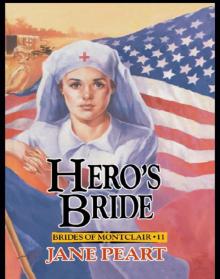 Hero's Bride
Hero's Bride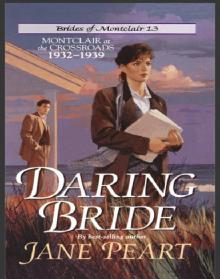 Daring Bride
Daring Bride Runaway Heart
Runaway Heart Promise of the Valley
Promise of the Valley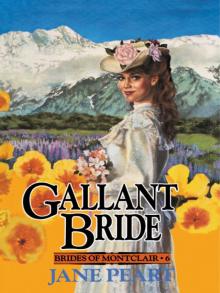 Gallant Bride
Gallant Bride The Pledge, Value
The Pledge, Value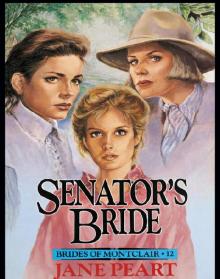 Senator's Bride
Senator's Bride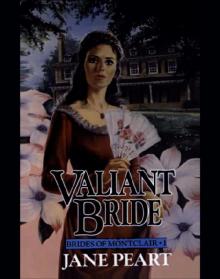 Valiant Bride
Valiant Bride Shadow Bride
Shadow Bride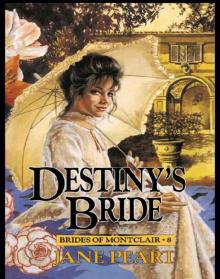 Destiny's Bride
Destiny's Bride A Tangled Web
A Tangled Web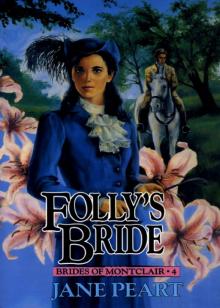 Folly's Bride
Folly's Bride The Promise
The Promise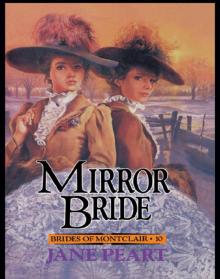 Mirror Bride
Mirror Bride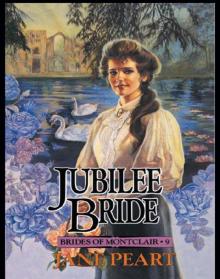 Jubilee Bride
Jubilee Bride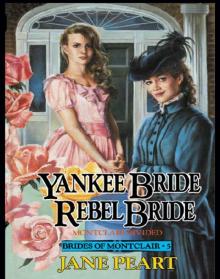 Yankee Bride / Rebel Bride
Yankee Bride / Rebel Bride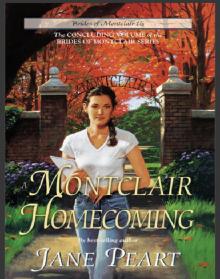 A Montclair Homecoming
A Montclair Homecoming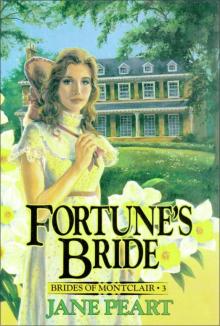 Fortune's Bride
Fortune's Bride Undaunted Spirit
Undaunted Spirit Love Takes Flight
Love Takes Flight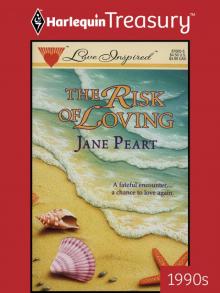 The Risk of Loving
The Risk of Loving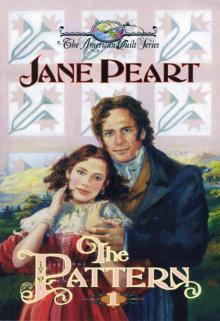 The Pattern
The Pattern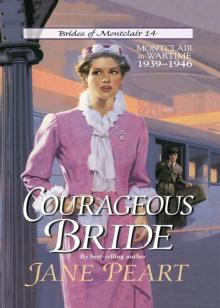 Courageous Bride
Courageous Bride